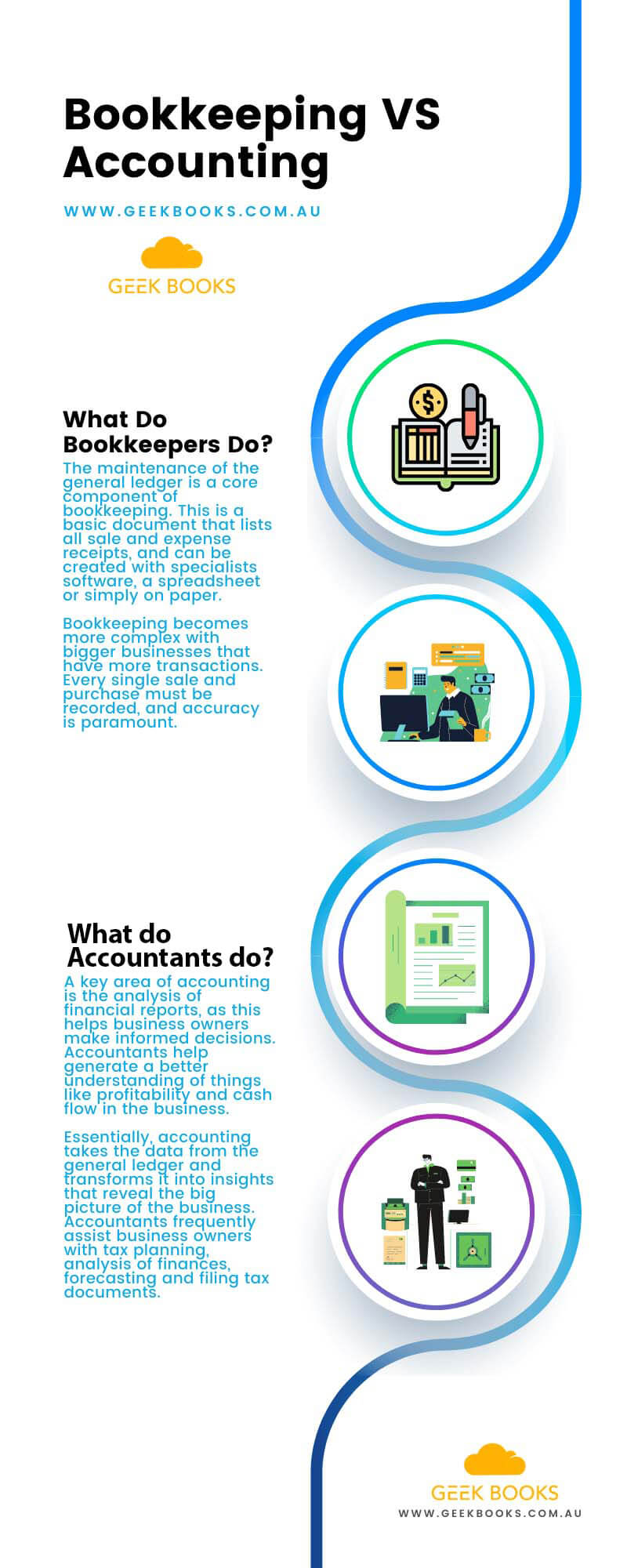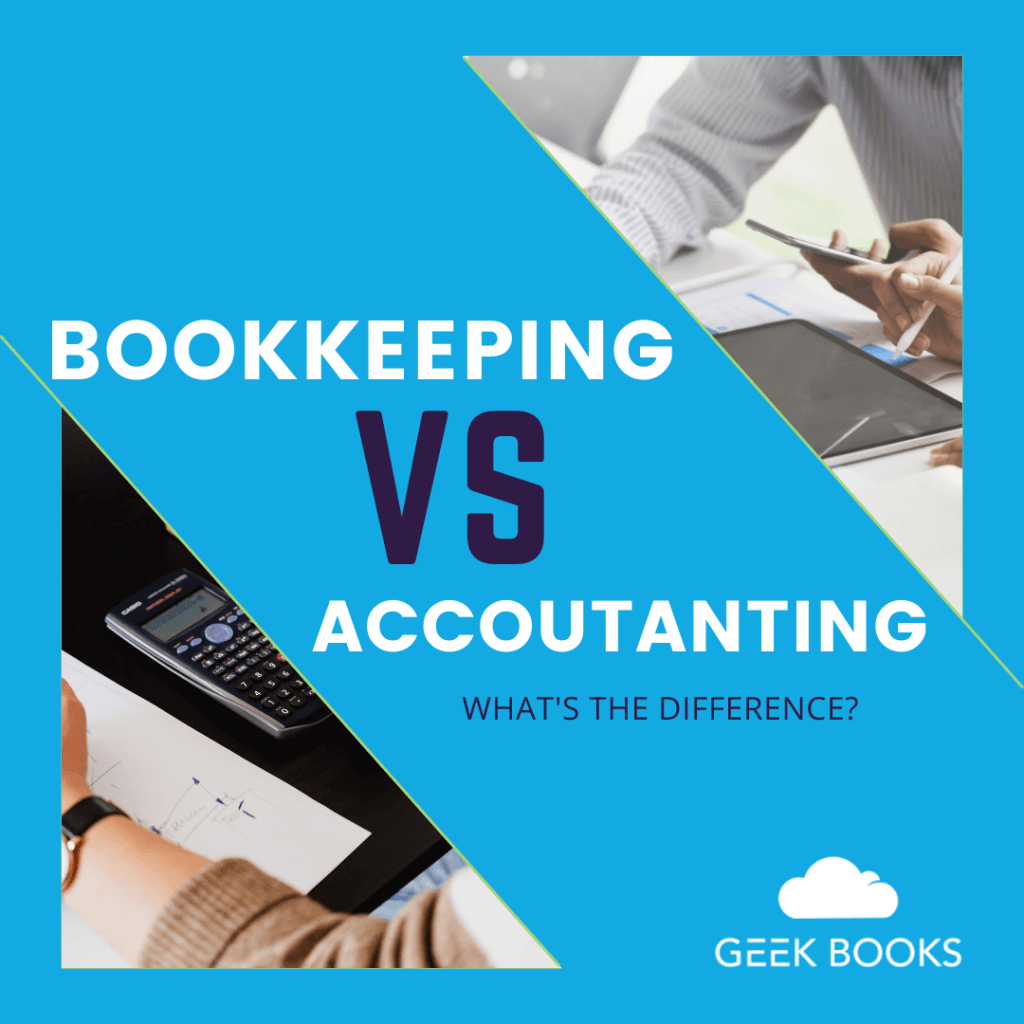Many people struggle to pin down exactly how bookkeeping differs from accounting.
It’s true that many of the goals of both are shared, but when you look closely at the difference between bookkeeping vs accounting, it soon becomes clear that they are not the same thing.
In a nutshell, bookkeeping is more about data entry and administration, consisting of recording financial transactions when they happen.
Accounting is a little more analytical, offering insights into the financial health of a business based on the information provided by the bookkeeper.
The careers have many similarities, and bookkeepers and accountants often work together.
In this article, we will discuss how accounting services and bookkeeping services differ.
Bookkeeping Vs Accounting
Bookkeeping is the process of recording all the financial data from transactions on a day-to-day basis.
Accounting is the process of collating all that data into business insights that can help business owners make informed decisions.
However, to explain bookkeeping vs accounting, we must take a closer look at what the two professions are all about.
Bookkeeping Explained
Geekbooks provides a summary of what is bookkeeping.
Bookkeeping is the record-keeping that must be done to ensure all transactions made by a business are recorded and stored in a database.
These records must be consistent and accurate, so it is useful for businesses of all sizes to have a bookkeeper or a team of bookkeepers tracking their financial activity.
The work of a bookkeeper involves:
- Recording transactions
- Posting credits and debits
- Creating invoices
- Preparing balance sheets, cash flow statements and income statements
- Maintaining the general ledger
- Payroll
See our bookkeeper duties checklist for a more complete picture of the role of a bookkeeper.
The maintenance of the general ledger is a core component of bookkeeping.
This is a basic document that lists all sale and expense receipts, and can be created with specialist software, a spreadsheet or simply on paper. Check out our run-down of some of the best free bookkeeping templates and accounts spreadsheets.
You may have also heard the term double entry bookkeeping. This is the process of balancing transactions across the various accounts that are affected. For more on this, read our in-depth answer to the question what is double entry bookkeeping? You can also get up to speed with other common bookkeeping terms here.
Bookkeeping becomes more complex with bigger businesses that have more transactions.
We go more into this in our bookkeeping guide.
Every single sale and purchase must be recorded, and accuracy is paramount.
The advantages of having a bookkeeper are:
- You have a professional with knowledge and training to be accurate
- It frees up your time to focus on your business
- The financial data is optimised and prepared for the accountant to work with
- They are efficient and cost-effective
With bookkeeping software available to businesses, some business owners invest in these solutions to manage the bookkeeping themselves.
However, it is still a time-consuming process, and without professional training and knowledge, there is still far more scope for human error to creep in.
Bookkeeping is far from a dying art.
Modern bookkeepers use the software available to improve efficiency, but it is their skills and knowledge that ensures consistency and accuracy. This is important to bear in mind when asking how much does a bookkeeper cost?
You can find out more about the basics of bookkeeping in our introduction to bookkeeping for beginners
Accounting Explained
Accounting is a highly skilled profession in which the financial data compiled by a bookkeeper is leveraged to produce financial models.
In this light, the processes are more subjective.
Accounting work generally consists of:
- Making adjustments by recording expenses that have occurred but are not yet recorded by the bookkeeper
- Reviewing the financial statements for the company
- Analysing the overall costs of operations to identify problem areas and opportunities for improvement
- Completing tax returns and compiling statutory accounts
- Assisting business owners in understanding the implications of financial decisions
A key area of accounting is the analysis of financial reports, as this helps business owners make informed decisions.
Accountants help generate a better understanding of things like profitability and cash flow in the business.
Essentially, accounting takes the data from the general ledger and transforms it into insights that reveal the big picture of the business.
Accountants frequently assist business owners with tax planning, analysis of finances, forecasting and filing tax documents.
The benefits of having an accountant include:
- Reducing tax liability and avoiding penalties
- Getting actionable insights to help grow your business
- Removing your stress and anxiety about taxes
- Freeing up time to focus on your business
- Keeping your business organised
If forced to say which is more useful out of bookkeeping vs accounting, one would probably lean towards accounting.
But the truth is that the work an accountant does is only as good as the bookkeeping on which it is based.
Without accurate bookkeeping, an accountant cannot process your tax documents accurately or provide true insights into your business.
The two really go hand-in-hand.
Incidentally, another query people sometimes have is bookkeeping vs accounting vs auditing.
For businesses, auditing is the process of going over the financial data to ensure it is accurate.
This can be done by comparing transactions data with bank statements, and it can be carried out by many bookkeepers and accountants.
A tax audit, on the other hand, is when the tax authorities choose to assess the accuracy of the documents and statements you file at the end of the financial year.
If they discover inaccuracies, you could be fined, underlining the importance of accuracy and consistency in your bookkeeping and accounting.
Bookkeeper vs Accountant: What Are The Differences?
To compare bookkeepers and accountants, we need to explore the areas where they differ and the ones where there are similarities or even crossovers.
Let’s first take an in-depth look at how they differ:
- Definition: bookkeeping is all about identifying and recording financial transactions, while accounting is about interpreting and communicating those transactions.
- Objectives: bookkeeping aims to maintain accurate records of financial transactions in a systematic way, while accounting aims to determine the financial health of a company and help prepare for the future.
- Decision-making: the data from bookkeeping cannot inform management decisions, but the data from accounting can.
- Preparing financial statements: bookkeeping does not compile financial statements, while accounting processes do prepare formal financial statements based on the bookkeeping data.
- Skill level: bookkeeping skills revolve around data entry and administration, while accounting requires high-level analytical skills.
- Anakysis: there is no financial analysis in bookkeeping, while accounting uses complex analysis of the records kept by the bookkeeper.
Next, let’s take a look at where there are similarities between bookkeeping and accounting:
- Both work with the financial data of a company
- They share a common goal of improving the financial situation of the business
- A knowledge of accounting and accounts software is required for both roles
- In many smaller businesses, the roles frequently overlap
- Both professions are tax compliant
Both bookkeeping and accounting have existed for a long time, and there has been a great deal of change in the work they do over the years.
This trend is likely to continue into the future as well, particularly as more technological advances come into play.
A good bookkeeper or accountant is always looking to embrace change as progress in their field.
The line between bookkeeping and accounting is becoming less defined.
With the complexity of accounting vs bookkeeping software, certain parts of the accounting process are being done at the bookkeeping stage, such as generating financial statements.
Both bookkeepers and accountants must be open to embracing technological advancements and emerging software.
These tools can enable both professions to better support their clients with additional services like payroll processing and credit card reconciliation.
Generally speaking, the larger your company, the greater your need for a bookkeeper becomes.
While a small business can benefit from the work of a bookkeeper, it may be easier for them to maintain their own records and just hire an accountant to handle the taxes.
Larger companies, with many thousands (or millions) of yearly transactions, may benefit more from having a bookkeeping services to keep all the records in order.
In either case, an accountant is likely to be an important resource.
This is because there are penalties for the incorrect filing of taxes, and it is important that everything is filed accurately and promptly.
Furthermore, the insights an accountant can provide may be extremely valuable in planning for the future, so virtually every business can benefit from their work.
Summary
At GeekBooks, we believe that both bookkeeping and accounting are extremely important for all businesses.
We have a wealth of experience in this domain, with a team of certified, professional bookkeepers with the skills to provide industry-leading service to our clients.
We always keep up-to-date with the latest changes in the market and look to work with emerging technologies and tools.
We provide expert bookkeeping tips as a starting point, but by outsourcing your bookkeeping to GeekBooks, you will be able to cut costs and spend more of your time focusing on the things you do best.
After all, you are not a tax expert, so bring in a team of tax experts to handle that side of the business on your behalf.
If you have any bookkeeping needs, please don’t hesitate to get in touch and talk to one of your friendly team members.
We will answer your questions and let you know how we can help.



